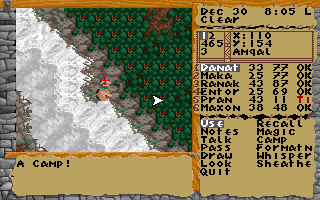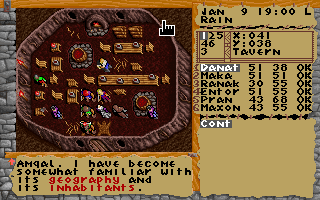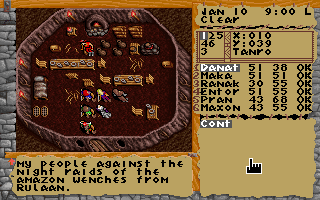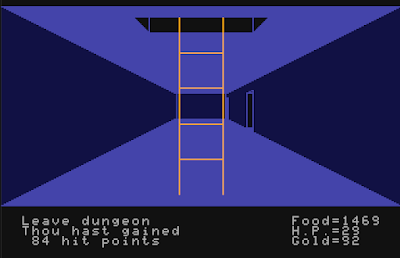Worlds of Legend: Son of the Empire
AKA Son of the Empire: Legend Worlds 1: This Time Its [sic] War!
United Kingdom
Mindscape (developer and publisher)
Mindscape (developer and publisher)
Released 1993 for Amiga and DOS
Date Started: 19 November 2023 Mindscape is one of my least favorite developers from this period. I say that with some sadness, because their games are always innovative. They just have a way of dragging on, getting too hard, and wearing me out. This is true of both the Anthony Crowther line (Captive, Knightmare, Liberation: Captive II) and the Anthony Taglione line represented in Bloodwych (1989), Legend (1992), and this game, meant to be the first in a line of Words of Legend titles.
(A quick note on the name: Both the game box and the manual give the title as Worlds of Legend: Son of the Empire, but the title screen, as you see, has the subtitle and main title reversed. My policy in such situations is to go with whichever title is most common among the three sources.)
 |
| This screen comes up while the game is loading. |
Both Bloodwych and Legend are among the small percentage of games that I couldn't bring myself to finish. With both, I have occasionally toyed with the idea of trying again. Bloodwych was a superior Dungeon Master clone that featured a rare mechanism for cooperative two-person gameplay. Legend was an isometric game with a fascinating magic system. Both impressed me before, ultimately, exhausting me. I thus start this game in a pessimistic mood.
Bloodwych concerned the efforts of one or two parties to save the land of Trazere from the evil Zendick, a wizard who had seized control from the ruling council, called the Bloodwych. Legend--called The Four Crystals of Trazere in the U.S. release--has a party save the land of Trazere from the sorcerer king, Necrix. At the end of the game, the characters establish the Bloodwych, demonstrating that Legend is a prequel to Bloodwych.
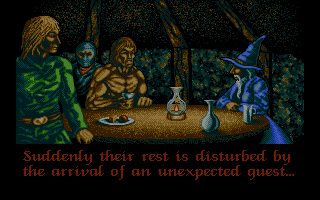 |
| Even in a tavern, the barbarian doesn't put on a shirt and the assassin doesn't take off his mask. |
Worlds of Legend lies somewhere in between, a sequel to a prequel. (Apropos of nothing, I was reminded the other day that the film The Scorpion King 4 is a sequel to a sequel to a prequel to a prequel to a sequel to a remake.) It adopts most of the mechanics of Legend, including the use of four defined characters: a barbarian, a runemaster, a troubadour, and an assassin. In Legend, these classes had been presented as coming from the north, south, west, and east, respectively. As the game begins, the victorious party is enjoying a drink in the "remote village of Brodfird" when a black-clad figure darkens the door. He brings a letter from the assassin's homeland, the Empire of the Moon. The assassin PC is apparently the son of the Emperor, who has just been assassinated. The letter comes from the emperor's sister and the PC's aunt, Sushiana. She begs the PC to return home to investigate. "I think that Ti-Mann MoChun is somehow connected," she writes; this is apparently the old emperor's sorcerer and aide.
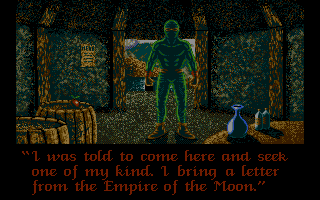 |
| Using an assassin to run an errand. |
My party had actually consisted of four female PCs, named after New Orleans jazz musicians. You can import them into the game or create new characters. I have never seen a greater variance between imported and created characters in a sequel. The imported characters retain their levels (in my case, Level 7), attributes, gold, spells, runes, reagents, and inventories from Legend, and their hit points double. [Ed. All of this is true except for the inventories. You lose your inventory and get a basic set of starting gear. I wasn't paying attention.] New characters start at Level 1 with virtually nothing.
Either way, the party must consist of a berserker, a troubadour, an assassin, and a runemaster, each of which is restricted to specific weapons, armor, other items, and abilities. New characters have attributes (strength, intelligence, speed, dexterity, constitution, luck) fixed; the only things to change are names and sexes. You can also alter starting attributes by clicking on one of four buttons to indicate that the character is particularly attuned to earth, fire, air, water, or some combination of these. Each one raises some scores and lowers others; clicking on all of them results in the same statistics as if you had clicked on none of them.
 |
| Creating a new party. |
The game begins at Sushiana's house in the city of Imperia, where she is happy that her nephew brought three friends to help. She suggests that the way to save the Empire is to bring her the four shards of the Eternal Amulet, which she can then reforge. In addition, Sushiana offers three services: the ability to rename characters, the ability to change their appearance ("reclothe"), and selling troubadour songs. I remember that "reclothing" was vital to my ability to actually discern my party members in the chaos of Legend's combat. As for learning songs, that's done in taverns in Legend, but the manual explains that taverns aren't as popular in the Empire. I still wonder why, given what's at stake, Sushiana won't teach us the songs for free.
In the rest of Imperia, you can buy horses or "enter vaults." This last option has you threatened by Ti-Mann MoChun before you enter a two-level dungeon whose purpose, I can only imagine, is to get non-imported characters up to speed.
The core of the gameplay takes place on these isometric planes that make up dungeon rooms. They look identical to those in Legend; as far as I can tell, nothing has changed in the interface or combat mechanics. You select an active character by clicking on his icon in the lower-left. You then select one of the commands on the bottom row or one of the icons in the lower-right to get the character to push something, take something, look at something, open something, shut something, use the character-specific tactic, use an item in the left hand, attack with the weapon in the right hand, or cast a spell. The fist (or whatever it is) causes the other party members to rally around the active character.
These combinations of commands are used for both combat and puzzle-solving, and the thing that I have difficulty remembering is that when targeting an enemy or object, you have to click the square at his base, not at the enemy or object directly. For instance, in the very first dungeon room, there's a notice posted to one of the pillars. Clicking on "Look" and then clicking on the notice directly causes nothing to happen; you have to click on "Look" and then the base square of the pillar to which the notice is attached.
Combat is a chaotic free-for-all in which your party members act on their own except when given specific instructions. In my reviews of Legend, I made comparisons with the real-time-with-pause systems of Darklands and the Infinity Engine games (e.g., Baldur's Gate). But there are numerous problems with the system as implemented here, including an inability to see anything about your foes, even their names, so you have no idea which ones to prioritize. Pathfinding is also horrible, rendered worse by extremely crowded rooms, so it's hard to target a specific enemy unless you happen to be standing next to him already.
The game is saved somewhat by its creative spell system, which I am going to have to re-learn. You mix spells by combining two types of runes: "director" runes and "effecter" runes. The latter specify what happens (e.g., healing, damage, teleportation) and the former specifies how the spell is cast (e.g., surrounding the caster, forward from the caster, as a missile that can go anywhere). Mixing a spell that uses "Surround-Healing" will heal all the people in the immediate area of the caster. "Target-Damage" is like a magic missile that streaks towards its target. But the particularly neat thing is that you can string together combinations of directors and effectors to create some spectacular effects, such as a targeted missile that itself spawns numerous missiles that fly in all directions, or a sequence that simultaneously casts every buffing spell on the party. In Legend, I admired these options but wasn't very good with them, and I ultimately quit playing when I simply couldn't survive any more combats no matter what tactics I used.
A new runemaster starts with only three runes--"Missile," "Damage," and "Healing"--which eases a new player into the system.
 |
| A runemaster starts with various spells pre-mixed. |
I'm not a fan of the interface. It essentially requires the mouse. There are keyboard backups for some actions, but they're relatively unintuitive. For instance, F1-F4 select the active character, which is fine, but F5-F10 control the actions at the bottom instead of more obvious selections like "L" for "Look" and "O" for "Open." The "ESC" key, which I'm always reaching for by accident, causes the party to engage in "flight" mode. "Pause" is mapped, for some reason, to the negative sign on the numberpad (and has no on-screen button, unlike most commands). There are no keyboard commands at all for two things that you want to do often: attacking and viewing the automap.
There are some passable sound effects--sword clangs, mostly--but you can't turn off music independently of sound, something that's basically unforgivable by 1993, so I'll be playing this one silent.
I played around in the dungeon for a while, reminding myself of the game's conventions. A sign at the entrance warned me that "fierce beasts" were roaming the halls of the imperial citadel. Decorations and furniture use Asian themes, such as taijitu (yin-yang symbols), little mini pagodas, and Buddha statues. You have to search every object in every room because any of them could contain treasures, including gold, weapon and armor upgrades, scrolls, potions, and keys necessary to progress in the dungeon.
Each character has an inventory of 16 items, to include weapons, armor, boots, helms, and gloves. I remember that the equipment system was a good aspect of Legend and almost every few rooms, I got some kind of upgrade.
I got frustrated with this game, though, when I lost one of my characters in the third combat despite healing him a couple of times. Given how much trouble I had with the predecessor, I'm tempted to use an imported party here, except that it feels like the imported party comes with far too many advantages, and I don't understand how the game could possibly be balanced. On the other hand, perhaps a little imbalance in my favor is what I'm looking for. I'm curious to hear the experiences of anyone who's played the game before I make a final decision.
Time so far: 1 hour








